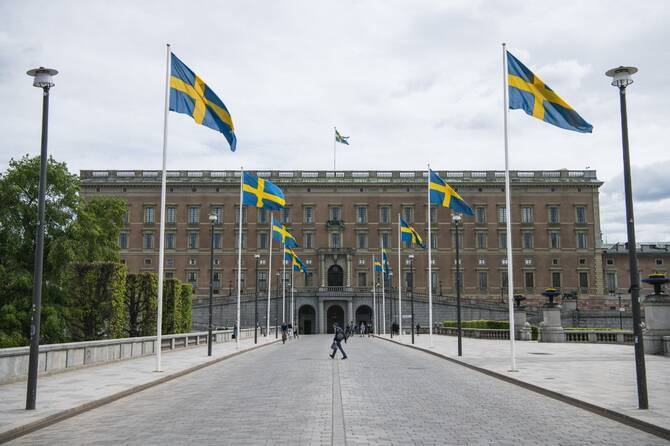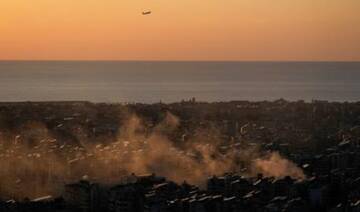PARIS/KYIV: Ukraine has managed to boost its Black Sea grain exports to a level not seen since before Russia’s invasion, although the Red Sea shipping crisis poses a new challenge to its crucial agricultural trade.
Kyiv’s success in replacing a UN-backed Black Sea export deal with its own shipping scheme has brought relief for Ukrainian farmers and importing countries while representing a naval breakthrough for Ukraine’s military as a land counteroffensive has stalled.
The export turnaround helped Ukraine’s economy to steady last year and further tamed global food prices after Russia’s invasion in February 2022 drove them to record highs.
Kyiv shipped around 4.8 million metric tons of foodstuffs in December, mostly grain, from its Black Sea ports, surpassing for the first time volumes achieved under the previous UN-sponsored corridor. Moscow quit that deal last July saying commitments to safeguard its own exports were not being respected.
Before Russia’s invasion, Ukraine exported about 6 million tons of food monthly via the Black Sea.
“The alternative Black Sea export corridor from Ukraine has definitely been a positive signal for the agricultural industry,” Svetlana Malysh, senior Black Sea agriculture analyst at LSEG, said, adding: “There are lot of concerns related to the situation in the Red Sea.”
Ukrainian grain exports by sea in January could drop by around 20 percent compared with last month, a senior Ukrainian official said last week, mostly because of the Red Sea crisis.
Strikes on shipping in the Red Sea by the Iran-aligned Houthis who control much of Yemen have stymied trade between Europe and Asia. The Houthis say they are acting in solidarity with Palestinians as Israel strikes Gaza. Their actions have prompted US and British air strikes against Houthi targets.
Passage through the Red Sea is very important for Ukraine as almost a third of its exports via the Black Sea corridor are sent to China.
Under its new export scheme, Ukraine is also supplying grain to Pakistan for the first time since Russia’s invasion, said Alexander Karavaytsev, senior economist at the International Grains Council.
Grain ships are increasingly being diverted away from the Suez Canal-Red Sea route, according to analysts and traders.
“The Red Sea situation is likely to hamper long-haul shipments from Ukraine,” Karavaytsev said.
BETTER THAN BEFORE
Ukrainian Black Sea food exports remain substantial. Over January 1-19, about 1.9 million tons were shipped via sea ports and another 1.7 million tons are still scheduled for January, said Spike Brokers, which tracks and publishes export statistics.
Ukrainian producers have welcomed the sea route as an improvement on both makeshift routes via the European Union and the UN-sponsored corridor, under which protracted cargo inspections with Russia drove up vessel charges.
“Since the invasion, now is the best time for farmers in terms of logistics,” said Dmitry Skornyakov, CEO of Ukrainian farm operator HarvEast.
Easing shipping costs have allowed depressed domestic prices in Ukraine to rise. Corn export prices have gained around $30 per ton since the start of the new corridor, while the cost of a medium-sized bulk vessel from Odesa to Spain has fallen by a similar amount, according to LSEG data.
Ukraine hopes to cement the role of its Black Sea corridor, which currently serves three ports in the Odesa region, by winning recognition from the UN’s International Maritime Organization, which could send a mission in February.
That could help ease worries about Russia’s military threat at sea.
EXPORT ROUTES
Ukrainian officials cite effective use of drones against Russian navy ships and the recapturing of an island near the Danube delta as allowing Kyiv to establish the route that hugs the Black Sea coast from Odesa down through Romanian and Bulgarian waters.
Kyiv now wants to re-open the port of Mykolaiv further east while maintaining transhipment via the Danube, Deputy Infrastructure Minister Yuriy Vaskov told Reuters.
Ukraine sees potential to raise total cargo shipments, including metallurgical products, from Black Sea and Danube ports to 8 million tons per month, against more than 7 million in December, he said.
Security for Ukrainian exports remains fragile as Russia intermittently strikes ports while the Black Sea is littered with mines.
If disruption to the Red Sea route to Asia persists, a fresh influx of cheaper Ukrainian grain in the EU may also deepen discontent among farmers in eastern member states such as Poland who have been staging protests.
But with Russia seen unlikely to actively target a food supply route serving countries that have not taken sides in the war, and with buyers lured by competitive Ukrainian prices, the sea corridor is expected to retain a sizeable role in global grain trade.
“In my view overall shipments by sea from Ukraine will continue to expand,” a European trader said, noting Ukrainian corn was sold to China last week despite Red Sea risks.















